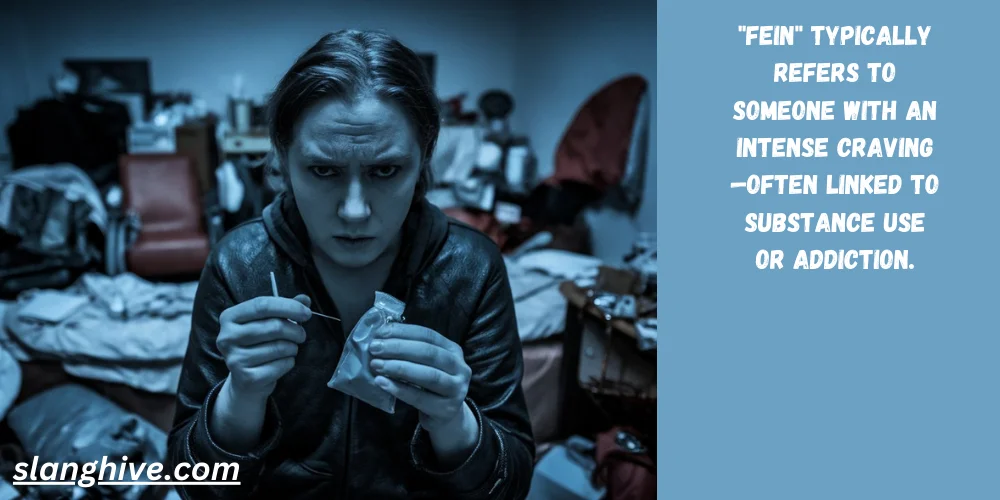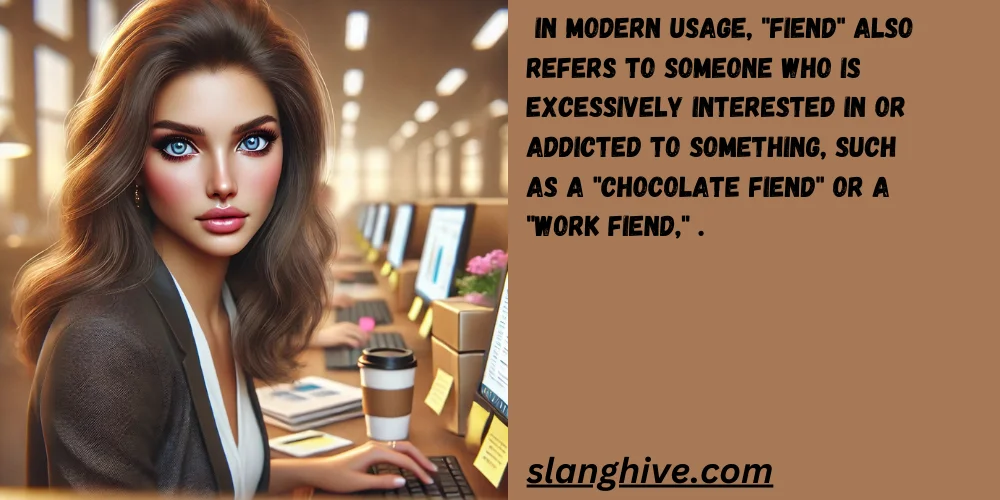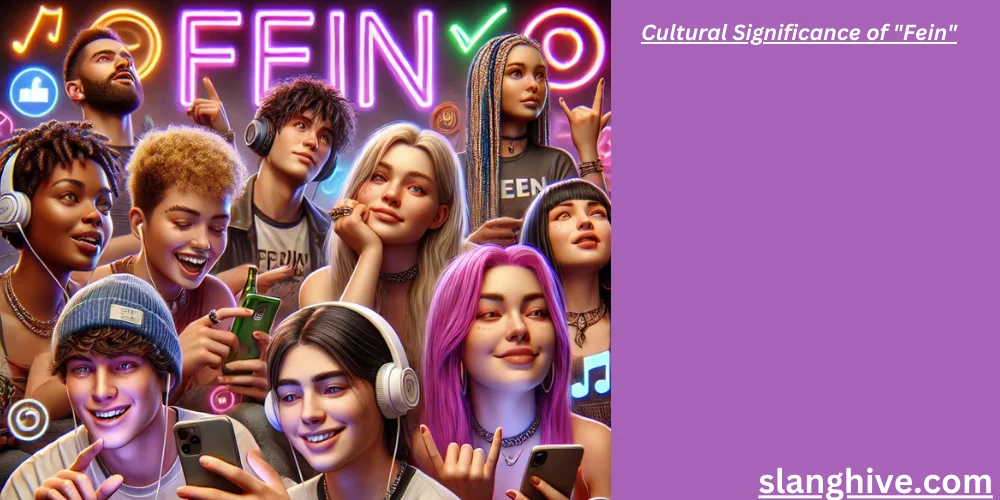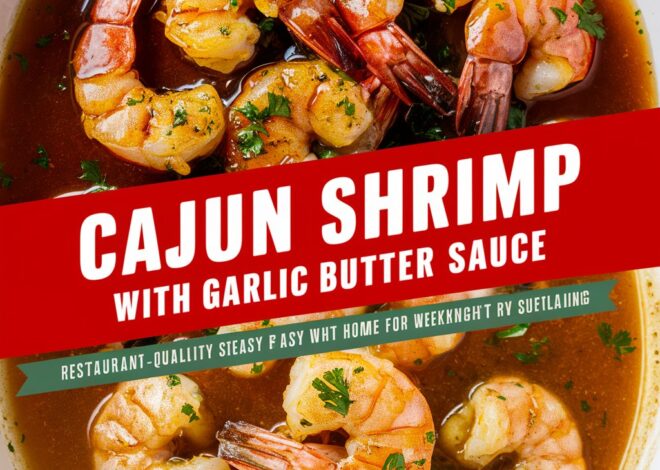
What Does ‘Fein’ Mean in Slang? The Viral Word Explained”
Slang constantly evolves, with words gaining new meanings through music, social media, and pop culture. One such term making waves is “fein.” Popularized by Travis Scott and Playboi Carti’s hit song “FE!N,” the word has exploded on TikTok and beyond. But what does “fein” actually mean?
At its core, “fein” typically refers to someone with an intense craving—often linked to substance use or addiction. However, some interpretations suggest it can also describe someone overly eager, mischievous, or obsessed with something, though this usage is less common. The term carries a level of controversy, as its association with addiction makes its casual use a topic of debate.
In this deep dive, we’ll explore the origins, meanings, and cultural impact of “fein,” breaking down why this slang word is both trending and polarizing.
- Research suggests “fein” in slang means someone with an intense craving, often for substances, popularized by Travis Scott and Playboi Carti’s song “FE!N” on TikTok.
- It seems likely that “fein” can also describe someone excited or mischievous, reflecting broader enthusiasm, though this is less common.
- The evidence leans toward “fein” being controversial due to its association with addiction, with some debate over its use in casual contexts.
“Fein” Meaning Slang
In slang, “fein” primarily refers to someone who is severely addicted to substances or has an intense craving for something. This usage was popularized by the song “FE!N” by Travis Scott and Playboi Carti, which has achieved significant success and cultural impact, especially among younger audiences on platforms like TikTok. However, the term has evolved and can also be used to describe someone excited, amped up, or mischievous, reflecting a broader meaning of intense enthusiasm or energy.
“Fein” Literal Meaning
The term “fein” is not a standard English word with a widely recognized literal meaning. However, it is derived from “fiend,” which literally means a malignant spirit or demon. In modern usage, “fiend” also refers to someone who is excessively interested in or addicted to something, such as a “chocolate fiend” or a “work fiend.”
“Fein” Cultural Significance
“Fein” holds cultural significance as it is deeply rooted in contemporary music and social media trends. The song “FE!N” has been commercially successful and inspired numerous memes and trends on TikTok, where users create content around the song’s themes and lyrics. This term reflects the dynamic nature of language in digital culture, where meanings can shift and expand rapidly through viral content and community engagement.
Comprehensive Analysis of “Fein” in Slang
This note provides a detailed exploration of the slang term “fein,” its literal and cultural meanings, and alternatives across different contexts, expanding on the key points for a thorough understanding. The analysis is informed by recent online sources, reflecting usage as of March 16, 2025.
Literal Meaning of “Fein”
The term “fein” is not a standard English word with a widely recognized literal meaning. However, it is derived from “fiend,” which has a literal meaning of a malignant spirit or demon. In modern usage, “fiend” also refers to someone who is excessively interested in or addicted to something, such as a “chocolate fiend” or a “work fiend,” reflecting its evolution into everyday language.

Some sources mention “fein” as a German word meaning “fine” or “good,” , but this is less relevant to its English slang usage. Given the context, the literal meaning for English slang purposes is tied to “fiend,” highlighting its roots in describing intense desires or obsessions.
The Slang Meaning of “Fein”
In slang, “fein” primarily refers to someone who is severely addicted to substances or has an intense craving for something. This usage was popularized by the song “FE!N” by Travis Scott and Playboi Carti, which has achieved significant success and cultural impact, especially among younger audiences on platforms like TikTok.
The song, released and going 3x Platinum, has sparked trends where “fein” is used to describe someone in the later stages of addiction, willing to do anything to get their fix.
However, the term has evolved and can also be used to describe someone excited, amped up, or mischievous, reflecting a broader meaning of intense enthusiasm or energy. where it’s described as someone who craves something intensely, similar to an addict, but also as someone who is energetic or wild, especially in TikTok videos.
Another layer is seen in discussions, where users note “fein” is short for “feenin,” meaning strongly wanting, needing, or being addicted to something or someone, originally tied to drug withdrawal but also used for sexual desire, like “She has me feenin!”
This multiplicity of meanings makes “fein” a protean term, depending on context, and often ambiguous without additional clues, reflecting its colloquial and dynamic nature in digital communication.
Cultural Significance of “Fein”
“Fein” holds cultural significance as it is deeply rooted in contemporary music and social media trends, particularly within Gen Z and Alpha communities. Key aspects include:

- Origin and Evolution: The term likely originated from “fiend,” with roots in describing addiction, and was shortened to “fein” in informal speech. Its popularity surged with the release of “FE!N” by Travis Scott and Playboi Carti, which belongs to the rage microgenre of trap music and features a chorus emphasizing the word “fiend.”
- Digital Usage: It’s prevalent on TikTok, with the hashtag amassing over 230,000 posts. Memes like the “I Hope They Play Fein” trend show users filming unexpected settings, hoping the high-energy song would play, highlighting its ironic and hype-driven use.
- Community and Controversy: The term’s association with addiction can be controversial, especially in casual contexts where it might normalize substance use. Discussions on Reddit and X posts reflect debates about its appropriateness, with some users noting commercial uses of the song in ads, like NBA and Gatorade, potentially overlooking its drug-related connotations,
This cultural shift reflects how slang evolves in digital communities, often drawing from music to create social commentary, but also highlighting tensions around sensitive topics like addiction.
Alternatives to “Fein” in Different Contexts
Given the varied meanings of “fein,” especially its association with addiction and intense enthusiasm, alternatives depend on the context and desired tone.
Below is a detailed breakdown, with examples, focusing on describing someone with intense cravings or energy:
| Context | Alternative | Description | Example Usage |
| Polite | Enthusiastic person | Respectful, indicating high energy, subtle. | “She’s an enthusiastic person at every event.” |
| Polite | Avid fan | Polite, for someone dedicated to a hobby or celebrity. | “He’s an avid fan of classic movies.” |
| Polite | Eager participant | Gentle way to express active involvement, neutral. | “He’s an eager participant in community projects.” |
| Professional | Individual with substance use disorder | Formal, clear, for addiction contexts. | “The program supports individuals with substance use disorders.” |
| Professional | Person with intense interest | Neutral, for strong passions, professional tone. | “She’s a person with intense interest in technology.” |
| Professional | Highly motivated individual | Formal, indicating drive, for work settings. | “Our team includes highly motivated individuals.” |
| Casual | Junkie | Informal, for drug addiction, can be pejorative. | “Be careful with him; he’s a junkie.” |
| Casual | Addict | Straightforward, for addiction, casual. | “She’s an addict; she needs help.” |
| Casual | Superfan | Playful, for extreme dedication, like to a band. | “I’m a superfan of that band; I’ve seen them 10 times.” |
| Casual | Wild one | Light-hearted, for someone energetic or mischievous. | “That kid is a wild one; he’s always running around.” |
These alternatives ensure respectful and appropriate communication, avoiding potential offense or misunderstanding associated with “fein,” especially in professional settings where discussing addiction is sensitive.
Texting Examples for User-Friendly Communication
- “He’s such a fein for that new video game; he plays it all day.”
- “She’s been acting like a fein since she started that new diet.”
- “I’m feeling like a fein for some pizza right now.”
- “That concert was amazing; the crowd was full of feins!”
- “He’s a fein for adrenaline; he loves extreme sports.”
- “She’s an enthusiastic person when it comes to volunteering.”
- “He’s an avid fan of the band; he’s been to all their concerts.”
- “The new employee is an eager participant in all team activities.”
- “The counselor is working with individuals with substance use disorders.”
- “She’s a person with intense interest in astronomy; she knows everything about stars.”
- “He’s a highly motivated individual; he’s always the first to finish his tasks.”
- “Be careful with him; he’s a junkie and might try to steal from you.”
- “She’s an addict; she needs professional help.”
- “I’m a superfan of that TV show; I’ve watched every episode multiple times.”
- “That kid is a wild one; he’s always running around and causing trouble.”
These examples are designed for easy reading and integration into articles, ensuring they look best in digital formats.
Conclusion
This analysis shows “fein” as a dynamic slang term, rooted in digital culture, with clear alternatives for various contexts. Understanding these nuances enhances communication, whether in polite, professional, or casual settings, reflecting the evolving nature of language in 2025.


